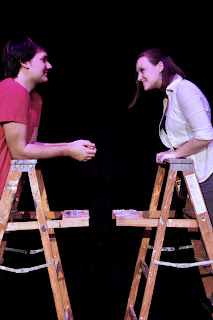This show has taken a while to completely cast. For starters, the casting panel faced a formidable array of talent during auditions. There was no shortage of actors for all of the roles.
But when the cast was announced, a number of actors dropped the show. Since Our Town is an ensemble show, there are numerous parts with only a few lines; not terribly appealing for someone who may be driving 30 minutes just to get to rehearsal. I've noticed that playwrights today rarely write walk-on or "bit" parts. It's simply too expensive for the larger union houses to cast a variety of equity actors just because the playwright wanted a street full of people milling about.
But we have, at last, arrived at a complete cast (with the minor exception of poor Farmer McCarthy who simply sits in the cemetery in Act III):
Patrick Barton- Stage Manager
The Gibbs Family
LD Green- Dr. Frank Gibbs
Whitney Zangarine- Mrs. Julia Gibbs
Matt Elliott- George Gibbs
Peyton Crenshaw- Rebecca Gibbs
The Webb Family
Jeff Brown- Mr. Charles Webb
Rita Hughes- Mrs. Myrtle Webb
Sarah McQueen- Emily Webb
Samuel Irving- Wally Webb
Shaun Furter- Joe Crowell, baseball player
Mario Garza- Howie Newsome, dead man #2
Matt Hudson- Professor Willard, dead man #1
Mike Roberts- Simon Stimson
Michel Stevens- Mrs. Soames
Reid Self- Constable Warren, Joe Stoddard, Man at back of
auditorium
Gia Ochsenbein- Si Crowell, baseball player
Doug Pfaffenberger -Sam Craig
Emily Morris- Woman in the balcony, dead woman #2
Sophia Slabic- baseball player
Estus Stephens- baseball player
Desi Stephens- Artistic lady in a box, dead woman #1
(And all of you can be in the choir!)
Beginning next week, it will be critical for all of you to be at rehearsals for every Act in which you appear. Katie and I want you to learn how to get on stage, how to get off, and what reality you create while you're there. OT is an ENSEMBLE show- that means EVERYONE is important! Even if all you're doing is ad libbing "Good night!" or "See you tomorrow," you are what makes the audience "see" Grover's Corners.
Speaking of Katie, thanks again for the great mime exercises! With your help, the cast is taking a simple gesture and creating an entire world.
Fun Fact about Our Town #5
We talked a bit about moveable type last night. So how did Editor
Webb create The Grover’s Corners Sentinel twice a week?
The invention of moveable type (around 1000 AD in the East and 1450 AD in the West) allowed writers to print relatively inexpensive books, papers, and
pamphlets. Very handy when you’re trying to accomplish a Renaissance or
Reformation.
But letter stamps (called “sorts”) had to be selected by hand, one
at a time, from a tray. Try this: Put both hands in your lap. Raise your right hand and type the letter “T.” Put your hand back in your lap. Raise your
right hand again and type the letter “h.” Let me know how long it takes you to
type “The quick brown fox jumps over the lazy dog.”
But in 1886, after some amount of trial and error, Ottmar Mergenthaler
invented the Linotype machine. This allowed a typesetter to create an entire
line of text (line-o-type) using a keyboard, which dropped sorts into a frame.
The entire frame was then immediately cast in hot metal and the sorts returned
to their trays so they could be used again. When the hot metal slug cooled, it
was used to print on paper and then re-melted and used again.
Before Mergenthaler’s Linotype machine, no newspaper in the world
had more than eight pages. (!) So only the most important ideas and events ever
made it on paper. But thanks to linotype, Mr. Webb was able to publish the details
of everything from birth announcements for twins to details of drunken
Polish men who fell asleep in a snowdrift.
Although I haven't actually researched this, my guess is that the Linotype machine allowed the creation of larger newspapers, which then had space to fill during slow weeks. And this, in turn, created a new job: the reporter.
 |
| Look at the keyboard: the keys on the left type lower case letters; the ones on the right are for uppercase letters. |
































